
The Project Gutenberg eBook of Bobby and Betty with the workers, by Katharine Elizabeth Dopp
Title: Bobby and Betty with the workers
Author: Katharine Elizabeth Dopp
Illustrator: Mary Spoor Brand
Release Date: March 21, 2023 [eBook #70328]
Language: English
Produced by: Stephen Hutcheson, Lisa Corcoran and the Online Distributed Proofreading Team at https://www.pgdp.net

BOBBY AND BETTY
WITH THE WORKERS
By
KATHARINE ELIZABETH DOPP
Formerly Instructor and Lecturer in the Extension Division of the
University of Chicago
Illustrated by
MARY SPOOR BRAND

RAND McNALLY & COMPANY
CHICAGO NEW YORK
Copyright, 1923
By Katharine Elizabeth Dopp
All rights reserved
Edition of 1928
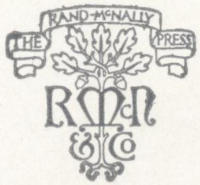
Made in U. S. A.
| PAGE | |
| The Milkman | 9 |
| The Milkman and His Horse | 10 |
| The Iceman | 13 |
| Making Apple Pies | 17 |
| Mother Wants a Cherry Pie | 20 |
| At the Baker’s Shop | 24 |
| Guess What is in My Pocket | 29 |
| A Talk with Father and Mother | 33 |
| Colly-Molly-Puff and the Muffin Man | 38 |
| What Shall I Buy with My Penny? | 45 |
| Father Tells a Story | 49 |
| At the Grocery Store | 54 |
| The Grocery Boy Comes with the Groceries | 61 |
| The Banana Man | 66 |
| The Fruit and Vegetable Man | 70 |
| Bobby and Betty Go to the Meat Market | 74[6] |
| What Bobby and Betty Found in Their Books | 80 |
| Bobby and Betty Make Shoes for Dolly | 84 |
| Bobby and Betty Go to the Shoemaker’s Shop | 88 |
| Playing Shoemaker | 93 |
| Bobby and Betty Go to the Shoe Store | 99 |
| Mother and Betty Go to the Dressmaker’s Shop | 105 |
| Bobby Goes With Father to the Tailor’s Shop | 109 |
| New Clothes for Bobby and Betty | 113 |
| Work and Play | 119 |
| The Scissors-Grinder | 122 |
| Mother Buys Betty a New Hat | 125 |
| Father Buys Bobby a New Hat | 129 |
| Bobby Learns Why Men Lift Their Hats | 133 |
| The Laundry Man | 137 |
| At the Barber’s Shop | 139 |
| The Broom Man | 143 |
| The Balloon Man | 148 |
| Bobby and Betty Follow the Hand-Organ Man | 152 |
| Why Mother ’Phoned to the Policeman | 158 |
| The Policeman Takes Bobby and Betty Home | 161 |
| Mother Talks with Bobby and Betty | 165 |
| The Newsboy | 170[7] |
| The Postman | 173 |
| How Bobby and Betty Earned Money | 177 |
| What Bobby and Betty Sold to the Old-Clothes Man | 182 |
| At the Hardware Store | 188 |
| Suggestions to Teachers | 193 |
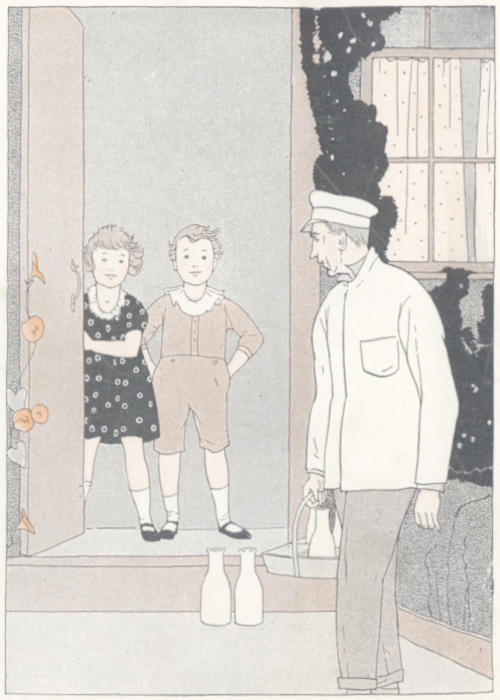
Bobby and Betty drink milk.
The milkman brings them milk every day.
He leaves two quart bottles at the back door.
He never forgets to bring the milk.
He never stays away when it storms.
Find the milkman.
Find Bobby and Betty.
The milkman has a wise horse.
The horse knows where to stop.
He knows when to stand still.
He knows when to go on.
He doesn’t try to run away.
The horse helps the milkman.
The milkman takes bottles of milk from his wagon.
Sometimes he takes out quart bottles.
Sometimes he takes out pint bottles.
He leaves milk at the back door.
He takes empty bottles away.
He puts the empty bottles in the milk wagon.
At the end of the week he knocks at the door.
Then Mother pays him for the milk.
How many quarts of milk does the milkman leave at your door every day?
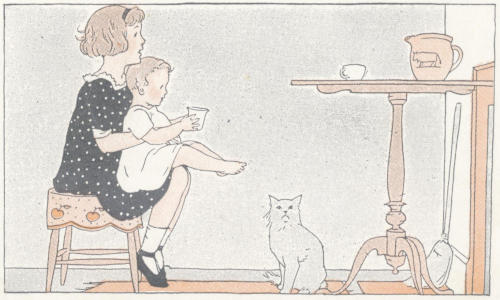
How many quarts of milk does the milkman leave at your door every week?
How much do you have to pay the milkman each week?
Name the days of the week. Count them.
How many pints make one quart?

Mother keeps milk in the ice box.
She likes to keep it cool and sweet.
The iceman passes every day with a big ice wagon.
When Mother wants ice, Betty puts up a card.
When the iceman sees it, he cries, “Whoa! whoa!”
The big horses stop.
The iceman jumps down from his wagon.
He brings in a big block of ice.
He puts it in the ice box, and Mother gives him a ticket.
The iceman goes back to his wagon.
He jumps in and drives away.
Once Bobby and Betty ran after the ice wagon.
Mother saw them and called them back.
“Don’t run after the ice wagon,” said Mother. “Play you have an ice wagon, Bobby. Hitch Queen to your cart.”
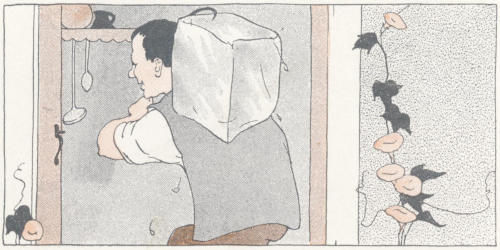
Composed by Children
Did you ever make a pie?
Bobby and Betty make pies.
Mother gives them little pieces of pie crust.
They lay the pie crust on the bread-board.
They roll it with a rolling-pin.
They put the pie crust on little pie tins and pat it down.
Then Mother gives each of them a nice red apple.
Bobby pares his apple.
Betty pares her apple.
They quarter the apples.
They core them.
They slice them and fill their pies.
They cover them with pie crust.
They trim off the edges.
Mother puts the pies in the oven.
When they are baked, Mother takes them out.
Bobby and Betty have them at dinner.

One day Mother said, “I want a cherry pie and I haven’t time to make it today.”
“Let me make it,” said Bobby.
“Let me make it,” said Betty.
“We won’t make a pie today,” said Mother. “We will buy one. You may go to the baker’s shop and buy a cherry pie.”
“Good!” said Betty.
“Come on,” said Bobby.
“Wait,” said Mother. “You cannot buy a pie without money.”
“That’s so,” said Bobby. “I forgot the money. I was going to be like Simple Simon.”
“Simple Simon couldn’t buy a pie,” said Betty. “He didn’t have a penny.”
“Can we buy a pie for a penny, Mother?” asked Bobby.
“Oh, no, Bobby. Pies cost more than they did when Simple Simon lived.”
“How much does a cherry pie cost, Mother?” asked Betty.
“Twenty cents,” answered Mother.
“Twenty cents!” cried Bobby.
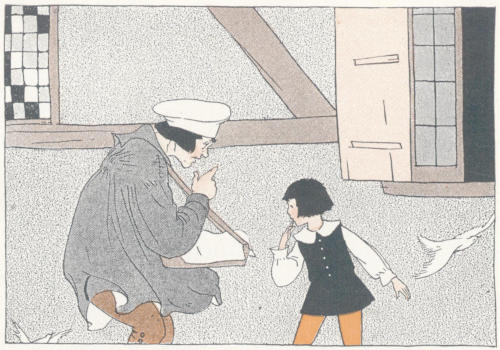
“Yes,” said Mother. “Here are two dimes. Bobby, you may carry the money this time.”
“Thank you, Mother,” said Bobby. “Come, Betty, let’s go.”
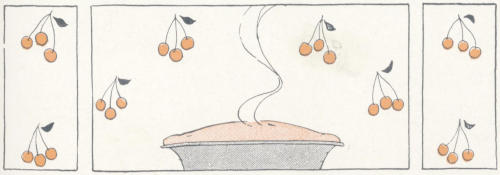
Soon Bobby and Betty were at the baker’s door.
They opened the latch and walked in.
“We shall have to wait until it is our turn,” said Bobby.
“How many are ahead of us?” asked Betty.
“Let’s count them,” whispered Bobby.
Bobby and Betty counted very softly, “One, two, three, four, five, six.”
“There are six ahead of us,” said Bobby.
While they were waiting, Bobby and Betty looked at the show-case.
“That’s a chocolate cake,” said Bobby.
“See those chocolate cookies,” said Betty.
“Where are the pies?” whispered Bobby.
“Up there,” said Betty. “Don’t you see them on that shelf?”
“Oh,” said Bobby. “I see them now.”
“It’s our turn next,” whispered Betty.
“What will you have little boy?” asked the baker.
“A cherry pie, please,” said Bobby.
“Here is a nice one,” said the baker. “It is just out of the oven.”
“How much is it?” asked Bobby.
“Eighteen cents,” answered the baker.
“Mother gave me twenty cents,” said Bobby.
“Pies are eighteen cents today,” said the baker. “What next?”
“That’s all Mother told us to buy,” said Bobby.
“Eighteen, twenty cents,” said the baker. “Here is your change. Is the little girl your sister?”
“Yes, sir,” answered Bobby.
“Good day,” said the baker. “Who is next?”
“Good day,” said Bobby and Betty.
“Let me carry the pie, Bobby,” said Betty.
Betty took the pie, and Bobby held the pennies in his hand.
“Why don’t you buy some chocolate cookies?” asked Betty.
“I don’t know,” answered Bobby.
“Please, Bobby, please buy some chocolate cookies!”
Bobby looked at the pennies.
He looked at the baker.
The baker was busy.
So Bobby put the pennies in his pocket
Bobby and Betty then left the baker’s shop and took the pie home to Mother.

Why does a baker wear a cap? To cover his head.
Bobby and Betty went straight home and gave the pie to Mother.
“Guess what is in my pocket!” said Bobby.
“What can it be?” asked Mother.
Bobby jingled the pennies.
“Pennies,” guessed Mother.
“You guessed right,” said Bobby. “Guess how I got them?”
“Did you find them on the way home?” asked Mother.
“No,” said Bobby. “Guess again.”
“Did the baker give you some change?” asked Mother.
“You guessed right this time,” said Bobby. “Here are your pennies.”
“Thank you,” said Mother. “You did right to bring me the change.”
“We wanted to buy some chocolate cookies,” said Betty.
“The baker has some nice cookies in his show case,” said Bobby.
“You may each have a penny,” said Mother.
“Oh, thank you, thank you!” said Bobby and Betty.
“May I buy a chocolate cookie with my penny?” asked Bobby.
“Yes, Bobby dear,” said Mother.[31] “The penny is yours. You may buy what you please.”
“May I buy a chocolate cookie with my penny?” asked Betty.
“Yes, Betty,” answered Mother. “It is your penny.”
“Was it mine when the baker gave it to Bobby?” asked Betty.
“No, dear,” answered Mother. “The penny was not yours.”
“Whose pennies were they when the baker gave them to Bobby?” asked Betty.
“I know,” said Bobby. “They were Mother’s pennies. That’s why we had to bring them to her.”

At dinner Father said, “I like cherry pie.”
“I like it,” said Mother.
“So do I,” said Bobby.
“We are like blackbirds,” said Betty.
“How do you make that out?” asked Father.
“Blackbirds they love cherry pie,” said Betty.
“When did you learn that old song?” asked Father.
“Last night,” answered Betty. “It’s in my book.”
“There’s a pieman in my book,” said Bobby. “Simple Simon met him. Simple Simon wanted to buy a pie, but he didn’t have a penny.”
“It takes money to buy a pie,” said Father. “Simple Simon learned that.”
“If I meet a pieman, I’ll buy a pie,” said Betty. “I’ll give him my penny for a pie.”
“Are there any piemen now?” asked Bobby.
“Piemen do not walk the streets now,” answered Father. “They sell pies and cakes in shops.”
“Is the baker a pieman?” asked Bobby.
“We don’t call him a pieman,” said Father, “but he makes and sells pies.”
“The baker sells bread, too,” said Betty. “He sells rolls and buns.”
“Why does the baker wear a white coat?” asked Bobby.
“He wants to keep clean,” said Mother. “He wants to keep everything in his shop nice and clean.”
“Bakers used to wear white aprons,” said Father. “Bakers and piemen always wore clean white aprons.”

“Where is the baker’s oven?” asked Betty. “I didn’t see it.”
“It is in his kitchen,” answered Mother.
“He must have a big oven,” said Betty.
“He has,” said Mother. “And he has a long wooden shovel to take the bread from the oven.”
“I’d like to be a baker,” said Bobby. “I’d like to have a baker’s shop and a great big oven. I’d like to make pies and cakes and muffins and bread and buns.”
“Let’s play we have a baker’s shop,” said Betty. “Let’s play we are baking bread in an oven. Let’s take the bread from the oven with a long wooden shovel.”
So Bobby and Betty played they were bakers. They made an oven with their blocks. And they made mud pies and little cakes and put them in their oven.

After dinner Bobby and Betty played with baby.
They played “Pat-a-cake, pat-a-cake, baker’s man.”
Then Bobby said, “Let’s give baby a ride.”
“Let’s do it,” said Betty. “Let’s give him a ride to the baker’s shop on his rocking horse.”
So they put baby on the rocking horse and gave him a nice ride.
Three times baby rode to the baker’s shop before Mother came to put him to bed.
Then Bobby and Betty went to the bookcase and took out their Mother Goose books.
“See, Father,” said Betty. “This is the pieman.”
“I see,” said Father. “That is Colly-Molly-Puff.”
“What did you say, Father?” asked Betty.
“Say it again, please,” said Bobby.
“Colly-Molly-Puff! Colly-Molly-Puff!” repeated Father.
“Colly-Molly-Puff! Colly-Molly-Puff!” repeated Bobby and Betty.
“That’s a funny name,” said Betty.
“Is that the pieman’s real name?” asked Bobby.
“No,” answered Father. “It’s a nickname. Long ago the pieman was called Colly-Molly-Puff.”
“Were all the piemen called Colly-Molly-Puff?” asked Betty.
“Not all,” answered Father. “One was called Tiddy-doll and another was called Gingerbread Harry.”
“What did Tiddy-doll and Gingerbread Harry sell long ago?” asked Betty.
“Cakes and pies,” answered Father. “All these piemen went up and down the streets calling out their wares.”
“Did they sell bread, Father?” asked Bobby. “Did they sell muffins and rolls?”
“No,” answered Father. “They sold cakes and pies. The muffin man went up and down the streets selling muffins and rolls.”
“I know the muffin man,” said Betty. “Here he is. See!”

“He is Colly-Molly-Puff’s brother,” said Father.
“Were they real brothers?” asked Bobby.
“No,” answered Father. “They were called brothers because one sold bread and the other sold pies.”
“I wish they were here now,” said Bobby.
“Let’s play they are,” said Betty. “I’ll be the muffin man.”
“Good!” cried Bobby. “I’ll be Colly-Molly-Puff.”
“O Daddy!” cried Betty. “I’m the muffin man.”
“I’m Colly-Molly-Puff, Daddy.”
“Perhaps Mother will dress you up,” said Father.
“That will be fun!” cried Bobby and Betty.
When Mother came in, she helped them dress as Colly-Molly-Puff and the muffin man. Then Father showed them how to call out their buns and muffins and cakes and pies.
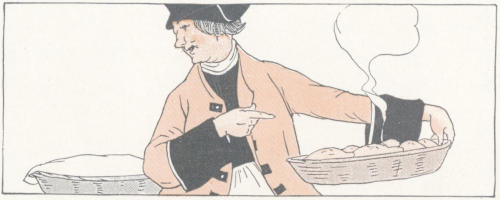
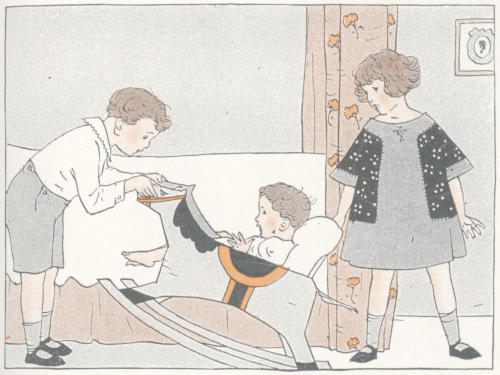

One night at dinner Bobby said, “I haven’t spent my penny yet.”
“I haven’t spent mine,” said Betty.
“Mother, when may we go to the baker’s shop and buy chocolate cookies?” asked Bobby.
“I am going to the grocery store tomorrow,” said Mother. “You and Bobby may go with me.”
“Perhaps I’ll buy something at the grocery store,” said Bobby.
“Perhaps I’ll buy a banana,” said Betty.
“Perhaps I’ll buy a big plum,” said Bobby.
“Perhaps I’ll buy a pear,” said Betty. “I like pears. I like them better than bananas.”
“Oh, I know what I’m going to buy,” said Bobby. “I’m going to buy a lollipop.”
“Perhaps I’ll buy a lollipop,” said Betty.
“You make me think of a story,” said Father.

“What is the story about?” asked Bobby.
“It’s about a little boy who found a penny,” said Father. “The boy didn’t know how to spend it.”
“Tell us the story,” said Betty.
“Oh, do,” said Bobby.
“Please, Daddy,” said Betty.
“Help Mother with the dishes,” said Father. “Then I will tell you the story.”
How many oranges make a dozen? How many in a half dozen?
Name things you buy of the groceryman by the dozen.
What does the baker sell by the dozen?

“The dishes are washed,” said Bobby.
“Yes, Father,” said Betty. “They are washed and wiped and put away.”
“Then I’ll tell you the story,” said Father.
“What’s the name of the story, Father?” asked Betty.
“What shall I do with this penny?” answered Father.
Bobby and Betty drew up their chairs and Father told them this story:
“Once upon a time, there was a very good little boy, who always minded his mother.
“One morning his mother said to him, ‘Take the broom and go and sweep the steps.’
“Now the little boy did not wait for his mother to tell him again. He took the broom and went out and began to sweep the steps.
“When he was sweeping, he heard a noise.
“He looked all around to see what it was, and what do you think he found?
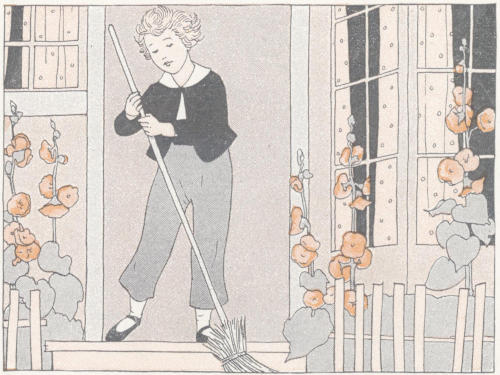
“A penny! and it was on the step he had been sweeping.
“‘O Mother, Mother!’ called the little boy. ‘See what I have found!’
“‘A penny!’ said his mother. ‘You have been a good boy. You may have this penny for your very own.’
“‘Oh, thank you, thank you!’ said the little boy, and he went on with the sweeping.
“While he was sweeping, the little boy thought, ‘What shall I do with this penny?’
“‘I have half a mind to buy some dates. But no, I should have to throw away the stones.’
“‘I will buy some apples. Oh, no, I will not, for I should have to throw away the cores.’
“‘I will buy some nuts. Oh, no, for I should have to throw away the shells.’
“‘What shall I buy then? I will buy some figs.’
“And so the little boy went to the grocery store and bought a penny’s worth of figs.”
“Is that all?” asked Bobby.
“That is all for this time,” said Father.
“That’s a nice story,” said Betty. “I’m glad the boy’s mother let him have the penny.”
“So am I,” said Bobby. “I don’t believe that little boy had many pennies to spend.”
What part of a banana is thrown away?
What part of a potato is thrown away?
What part of a turnip is thrown away?
What part of an egg is thrown away?
What part of a nut is thrown away?
Where do you put the things that are thrown away?
Why do we have garbage cans? Where do we keep them?
What does the garbage man do? Are you glad there are garbage men to take away the garbage?
Make a little song to thank the garbage man for helping us keep things nice and clean.
Bobby and Betty were up early next morning.
“We are going to the grocery store today,” said Betty when she came down stairs.
“Hurrah!” cried Bobby. “I’ll spend my penny. Here it is. I’ll put it in my coat pocket now.”
“Mine is in my shopping bag,” said Betty.
After the breakfast dishes were put away, Mother sat down to write.
“I know what Mother is writing,” said Betty.
“What is Mother writing?” asked Bobby.
“The names of the things she is going to buy,” said Betty. “Isn’t that what you are writing, Mother?”
“Yes, dear,” answered Mother. “I am making a list of the things to buy at the grocery store.”
All were soon ready to go.
Mother put baby in his carriage.
Betty carried her shopping bag, and Bobby had a market basket on his arm.
“Oh, see what is in the window!” said Bobby when they came up to the grocery store.
The groceryman had a beautiful window.

There were baskets of ripe red apples.
There were baskets of big blue plums.
There were rows of oranges and lemons.
There were ever so many kinds of fruit in the groceryman’s window.
“A fine day, Madam,” the groceryman said, when they went in the store. “What can I do for you today?”
“I want some fresh eggs,” said Mother.
“These are fresh from the country,” said the groceryman.
“I will take two dozen,” said Mother.
“What will you have next?” asked the groceryman.
“A pound of your best butter,” said Mother.
“Do you need potatoes?” asked the groceryman.
“Put me up a peck,” said Mother. “And I will take this basket of ripe tomatoes.”
“Any fruit?” asked the groceryman.
“How much are the peaches?” asked Mother.
“Thirty cents a basket,” answered the groceryman.
“I will take a basket of peaches,” said Mother.
“Anything else, Madam?” asked the groceryman.
“That is all today, thank you,” said Mother.
“Do you wish to take anything with you?” asked the groceryman.
“I will take the butter and eggs,” said Mother. “You may send the other things.”
Mother paid for the groceries, then turned to Bobby and Betty.
Betty had bought a big blue plum.
But Bobby wanted to cross the street and buy a lollipop.
“You may,” said Mother. “The way is clear now. You may cross over. Be sure to come right back.”
Bobby ran across the street and was soon back with a lollipop.
“Take a bite, baby,” said Bobby.

And Bobby gave baby a bite of his lollipop.
“Take a bite, baby,” said Betty.
And Betty gave baby a bite of her big blue plum.
“We must go home now,” said Mother to the children.
Then she put the butter in Bobby’s basket and the eggs in the carriage at baby’s feet.
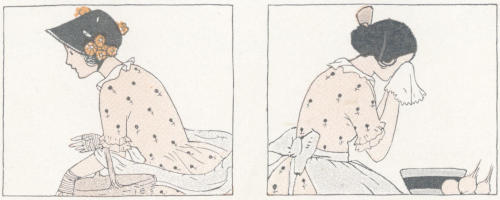
“Do you hear that wagon?” asked Bobby. “It’s coming bumpety, bumpety, bumpety, bump!”
“Yes,” answered Betty. “How that wagon rattles and bumps! O Bobby, it’s stopping here!”
“Oh, I know now what wagon it is,” said Bobby. “It’s the grocery wagon. The grocery boy is bringing Mother’s groceries.”
“Let’s run and meet him,” said Betty.
“Did you bring something for us?” Bobby asked the grocery boy.
“Yes,” said the grocery boy. “This box of groceries is for your mother.”
By this time the grocery boy was at the back door. Mother met him.
“Your groceries, Madam,” said the boy as he put the box on the kitchen floor.
“Thank you,” said Mother.
When the boy went back to his wagon, Bobby asked, “Is that your horse?”
“No, but I drive it.”
“Is that your wagon?” asked Betty.
“No,” answered the grocery boy. “It belongs to the groceryman.”
“What is in the wagon?” asked Bobby.
“Groceries.”
“What are you going to do with them?” asked Bobby.
“Take them to the people who paid for them,” said the boy.
“Did they pay you?” asked Bobby.
“No,” answered the grocery boy. “They paid the groceryman.”
“Does anybody pay you?” asked Bobby.
“The groceryman pays me,” said the boy, and he jumped into the wagon and drove away.
“The groceryman has everything nice to eat,” said Betty. “His store is full of nice things to eat.”
“Let’s play we have a grocery store,” said Bobby.
Just then Mother called, “Come, Bobby! Come, Betty! Help me put the groceries away.”
Bobby and Betty helped Mother.
Then she gave them the box the grocery boy left.
“That’s just what I want, Mother,” said Betty. “That will make a nice grocery store.”
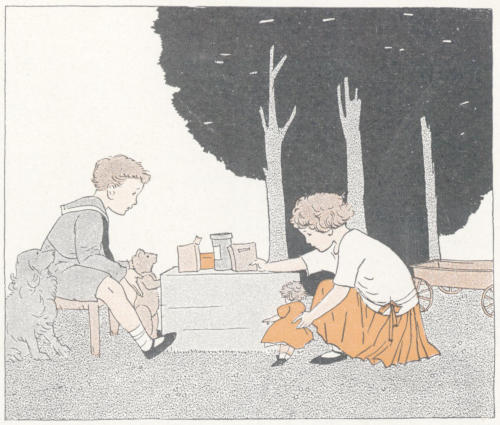
Mother gave them some empty boxes to put in their grocery store.
They had a good time playing store.
Dolly and Teddy-bear came to their store to buy groceries.
Then Bobby hitched Queen to his cart to take the groceries to Dolly and Teddy-bear.
Name things you buy by the peck.
How many quarts in a peck?
How many quarts in half a peck?
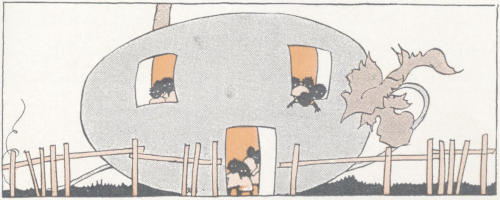
“Ba-na-nas! Ba-na-nas!” called the banana man.
“Who is calling?” said Bobby.
“The banana man,” answered Betty.
“I see him,” said Bobby. “He is coming down the street with his pushcart.”
Again the banana man called out, “Ba-na-nas! Ba-na-nas!”
“Let’s ask Mother if we can buy some bananas,” said Bobby.
Bobby and Betty ran in to Mother.
“O Mother,” said Betty. “The banana man is coming. Please buy some bananas.”
“Please, Mother,” said Bobby.
“You may buy a dozen for me,” said Mother. “Betty, it is your turn to buy today.”
“Why can’t I do it?” asked Bobby.
“Not this time,” said Mother. “It is Betty’s turn today.”
Mother gave Betty thirty-five cents, and she bought a dozen bananas.
The banana man then went down the street calling, “Ba-na-nas! Ba-na-nas! Ba-na-nas!”
Mother had bananas at dinner that night.
Betty told Father about the banana man, and Bobby told him about his pushcart.
When the story hour came, Father said, “See if you can find the banana man in your Mother Goose books.”
Bobby and Betty looked through their books.
“I can’t find the banana man,” said Bobby.
“Here’s a woman with a wheelbarrow,” said Betty. “Does she have fruit to sell?”
“Yes,” answered Father. “That is the cherry woman.”
“Did she sell cherries?” asked Bobby.
“Yes,” answered Father. “She sold cherries and oranges and lemons.”
“She doesn’t come here,” said Betty.
“No, dear,” said Father. “Women don’t sell fruit from wheelbarrows on our streets.”
“Why not?” asked Betty.
“Because that work is now done by men,” Father answered.
“The banana man has a pushcart,” said Bobby. “But the fruit and vegetable man has a horse and wagon.”

“Beets! beets! Three bunches for a dime! Beets! beets! Three bunches for a dime!” called a boy at the back gate.
“The fruit and vegetable man is at the back gate,” said Bobby. “Do you want to buy anything?”
“I will go to the door,” said Mother.
“Strawberries! strawberries! Two boxes for a quarter! Strawberries! strawberries! Two boxes for a quarter!” called the boy at the back gate.
“Bring me two boxes of strawberries,” said Mother.
“Do you want any beets?” asked the boy. “They are three bunches for a dime.”
“Bring me three bunches,” said Mother.
The fruit and vegetable man took the beets and strawberries out of the wagon.
The boy brought them to the kitchen door.
“Can you change fifty cents?” asked Mother.
“Yes,” said the boy. “Thirty-five, forty, fifty cents.”
“How much did he give you, Mother?” asked Bobby.
“Fifteen cents,” answered Mother. “That is the change.”
“I want to know how to make change,” said Bobby.
“So do I,” added Betty.
“You can learn, Bobby,” said Mother. “Take out your toy money, children. Buy and sell and learn to make change.”
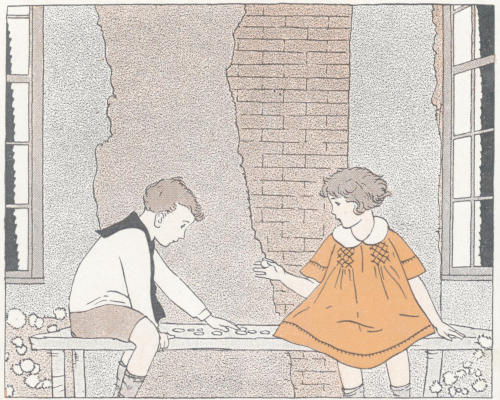
“Bobby! Betty!” called Mother one morning.
Bobby and Betty came in from their play.
“What is it, Mother?” asked Bobby. “What do you want?”
“I want you to go to the meat market and buy a pound of ham.”
“I’ll buy it,” said Bobby.
“Let me buy it,” said Betty.
“You may buy the ham today, Bobby,” said Mother. “Here is the money. Bring me the change.”
Bobby and Betty went down the street.
They were soon in front of the meat market.
“O Betty!” cried Bobby. “Look at those birds.”
“They are not birds,” said a lady. “They are chickens.”
Bobby and Betty looked at the chickens.
They were poking their heads out of a cage.
“The chickens want to get out of the cage,” said Betty.
“I wish they were out,” said Bobby. “I want to see them run.”
“Let’s go into the meat market,” said Betty.
They went in and waited their turn.
While they were waiting, they saw a rabbit hanging on a hook.
“What’s that?” asked Betty.
“I think it’s a rabbit,” answered Bobby.
“I wish I had one,” said Betty.
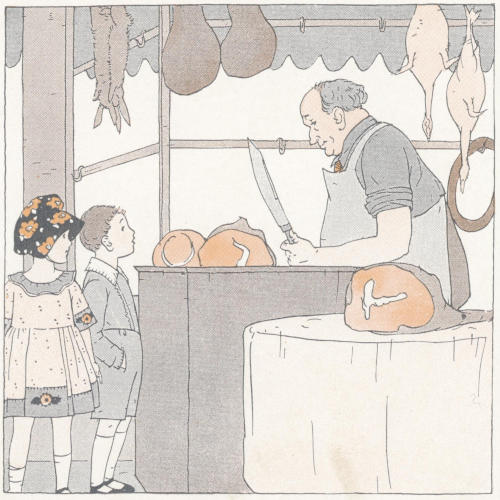
“Good morning,” said the big man behind the counter. “What can I do for you today?”
“I want a pound of ham,” said Bobby.
The man took a ham from a hook and cut off three slices.
He put the slices of ham on the scales.
“That is just one pound,” he said. “What next?”
“That is all,” said Bobby. “Here is the money.”
Bobby put the change in his pocket.
“Let me carry the ham, Bobby,” said Betty.
“No,” said Bobby. “Mother told me to buy it.”
“Let me carry it, I say!” cried Betty.
“No, no, no!” cried Bobby. “You bought the bananas. It’s my turn to buy today.”
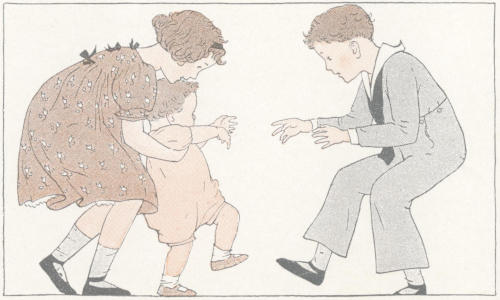
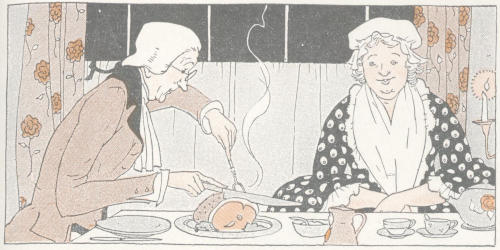
Pork is the flesh of the ⸺.
Beef is the flesh of the ⸺.
Mutton is the flesh of the ⸺.
Ham is the ⸺ of a ⸺ cured by salting and smoking.
When the story hour came, Bobby and Betty took their books from the bookcase.
“See, Father,” said Bobby. “See the man with the chickens.”
Father looked at the picture in Bobby’s book.
“What is the man going to do with the chickens?” asked Bobby.
“He is going to sell them,” answered Father.
“I know where he is going,” said Betty. “He is on his way to the meat market.”
“No, dear. The chicken man used to sell chickens from his basket on the street.”
“Does he do it now?” asked Betty.
“No, Betty,” answered Father. “It was a long time ago that the chicken man sold chickens on the street.”
“We saw chickens today,” said Bobby. “They were in a cage just outside the meat market.”
“We saw a rabbit, too,” said Betty.
Just then Betty turned a page in her book and came to the picture of a rabbit woman.
“See,” said Betty. “The woman has rabbits on a pole.”
“She has geese, too,” added Bobby.
“Who is she?” asked Betty. “What is she doing?”
“She’s a rabbit woman,” said Father. “She is going down the street selling rabbits and geese.”
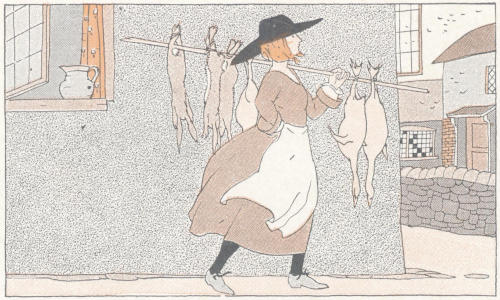
“Is there a rabbit woman on our street?” asked Betty.
“No, dear,” answered Father. “The rabbit woman lived a long, long time ago.”
“Now we buy rabbits at the meat market,” said Bobby.
“Did the people have markets long ago?” asked Bobby.
“Yes,” answered Father. “They had markets. But they also had men and women who sold their wares on the streets.”

“Dolly has lost her shoe,” said Betty. “I can’t find it anywhere.”
“Look again,” said Mother.
Betty looked and looked, but she could not find it.
Bobby looked and looked, and he could not find it.
“O Mother, what shall I do?” asked Betty.
“Make a shoe,” said Mother.
“I don’t know how,” said Betty.
“Mother will show us how to make shoes,” said Bobby. “Won’t you, Mother?”
“Yes, dear,” answered Mother.
Then Mother showed Bobby and Betty how to make shoes for Dolly.
That very day Grandfather came to see Bobby and Betty.
“See, Grandfather,” said Betty. “See dolly’s new shoes.”
“They are very nice,” said Grandfather. “Who made them?”
“I made this one,” said Betty.
“I made that one,” said Bobby.
“You are good shoemakers,” said Grandfather. “Listen and I’ll sing a shoemaker’s song.”
Bobby and Betty drew up their chairs close to Grandfather’s big chair.
Then Grandfather sang this song:
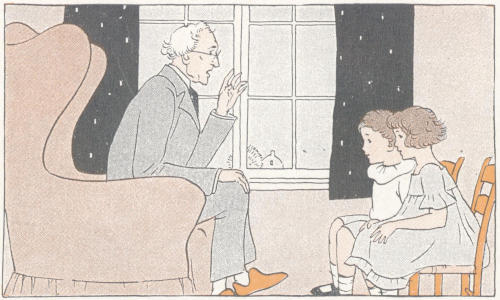
“Sing it again,” said Bobby.
“Please do,” said Betty.
Then Grandfather sang the song and Bobby and Betty sang with him.

“There’s a hole in my shoe,” said Bobby.
“There’s a hole in mine, too,” said Betty.
“Let me see your shoes, children,” said Mother.
Bobby and Betty showed Mother their shoes.
“Take off your shoes,” said Mother. “Put on your new shoes.”
Bobby went to the closet off his bedroom and took out his shoes and put them on.
Betty went to the closet off her bedroom and took out her shoes and put them on.
“Now take your old shoes to the shoemaker,” said Mother. “Ask him to mend them.”
Mother gave Bobby and Betty some money to pay the shoemaker.
They were soon at the door of his shop.
They stood and listened to the shoemaker’s hammer.
“Rap-a-tap-tap! Rap-a-tap-tap!” went the shoemaker’s hammer.
Bobby and Betty opened the door and went into the shop.
“Good morning,” said the shoemaker.
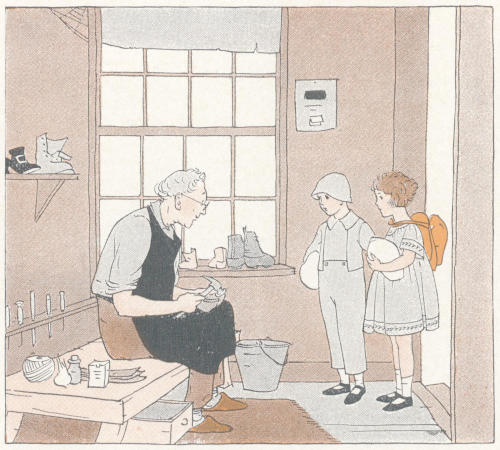
“Good morning, good morning,” said Bobby and Betty.
“What can I do for you today?” asked the shoemaker.
“Will you please mend my shoe?” asked Bobby.
“Will you please mend my shoe?” asked Betty.
“Yes, yes,” said the shoemaker. “I will mend your shoes.”
“Here are my shoes,” said Bobby.
The shoemaker looked at Bobby’s shoes.
He looked at Betty’s shoes.
Then “Rap-a-tap-tap! Rap-a-tap-tap!” went the shoemaker’s hammer.
Bobby and Betty watched the shoemaker work.
They kept time with his hammer.
It was not long before the shoes were mended.
“Here are your shoes,” said the shoemaker.
“Thank you,” said Bobby.
“Thank you,” said Betty.
Bobby and Betty paid the shoemaker for mending their shoes.
“Thank you,” said the shoemaker.
Then Bobby and Betty said, “Good-day,” and went home with their shoes.
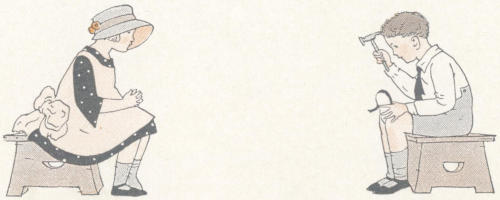
One day Bobby and Betty had a party.
They played they were shoemakers mending shoes.
All but Bobby sat down on the floor so as to make a ring.
Then they sang:
While they were singing Bobby came into the room.
When they stopped singing, he said;
“Yes,” said the shoemakers. “We will have it done by half-past two.”
Then the shoemakers worked and sang:
Soon Bobby came back and said, “It is half-past two. Is my shoe mended?”
“I have passed it to my next-door neighbor,” answered the head shoemaker.

“Is my shoe mended?” asked Bobby of the next-door neighbor.
“My next-door neighbor has it,” was the answer.
Then Bobby asked the next child; but he always got the same answer.
At last he saw who had the shoe, so he asked the right one.
Then all the shoemakers called out:

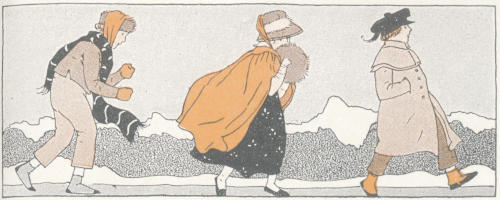
“Dear me, dear me!” said Mother one night at bedtime when she looked at Bobby’s shoes.
“What’s the matter, Mother?” asked Bobby.
“How do you wear out your shoes so fast?” asked Mother. “These shoes are not fit to wear.”
“I’ll take them to the shoemaker,” said Bobby. “He’ll mend them.”
“They are past mending,” said Mother. “You must wear your other shoes every[100] day, and we will go to the shoe store and buy a new pair.”
“May I have a new pair?” asked Betty.
“Let me see your shoes,” said Mother.
Betty came up close to Mother.
“Why, Betty!” said Mother. “Your shoes are almost as badly worn as Bobby’s.”
“May I have a new pair, Mother?” asked Betty.
“Yes, Betty,” answered Mother. “We will go to the shoe store tomorrow.”
The next day Bobby and Betty went with Mother to the shoe store.
“Shoes for children,” answered Mother when the salesman asked what he could show her.
“What kind, Madam?” asked the salesman.
“Nice, soft shoes,” said Mother, “and shoes that will wear well.”
“Their last shoes were nice and soft; but they did not wear well.”
“Children are rough with their shoes, Madam,” said the salesman.
“Better get something heavier than they have been wearing.”
“I want heavy shoes,” said Bobby. “That’s the kind the big boys wear.”
“How do you like these, Madam?” asked the salesman.
“They seem heavy for a child,” said Mother.
“I like those shoes,” said Bobby.
“Let him try them on,” said the salesman. “Let’s see how they fit. And let’s see how this shoe fits the little girl.”
The salesman then took off one of Bobby’s shoes and put a new shoe on his foot.
He took off one of Betty’s shoes and put a new shoe on her foot.
“Be sure the shoes are long enough,” said Mother. “The children are growing fast.”

“These fit very well,” said the salesman. “See, Madam, there is plenty of room.”
“How do they feel?” asked Mother.
“All right,” answered Bobby.
“These are nice shoes,” said Betty. “I like them.”
“I will take these shoes,” said Mother.
The salesman put the shoes in shoe boxes and Mother paid him for them.
Then they went into the dry-goods store, and Mother bought each of the children two pairs of new stockings.
“Mother is going to the dressmaker’s today,” said Bobby. “I heard her say so.”
“I wish I could go with her,” said Betty. “I am going to ask Mother if I can go.”
“She won’t let you go,” said Bobby. “Little girls don’t go to the dressmaker’s.”
“Yes, they do,” said Betty.
Betty ran to the house. “Mother, Mother!” she cried. “Please may I go with you to the dressmaker’s?”
“Don’t you want to stay with Bobby and play with baby?” asked Mother.
“No,” said Betty. “I want to go with you.”
“I will see,” answered Mother.
Mother then called Bobby.
“Play with baby, Bobby,” said Mother. “Betty wants to go with me to the dressmaker’s.”
“Don’t let Betty go,” said Bobby. “Make her stay and take care of baby.”
“Betty will stay when you go with Father to the tailor’s shop,” said Mother. “You may go with Father when he goes to the tailor’s.”
“All right,” said Bobby. “I’ll stay if I may go with Daddy.”
Mother and Betty went to the dressmaker’s.
The dressmaker fitted Mother’s new dress.
Betty thought Mother stood very still while the dressmaker put pins in her dress.
The dressmaker pinned and pinned and pinned.
Betty thought she would never stop putting pins in Mother’s new dress.
Betty sat very still.
She looked at the dresses in the shop.
She was glad when Mother’s dress was fitted.
“When may I have it?” asked Mother.
“I will send it Saturday,” said the dressmaker.
“Thank you,” said Mother. “Be sure to send the bill. I am glad you can let me have the dress before Sunday.”
When Father came in sight, Bobby ran to meet him.
“When are you going to the tailor’s, Daddy?” asked Bobby.
“Tomorrow morning,” answered Father.
“May I go with you?” asked Bobby. “Please, Daddy.”
“No, Bobby, there is nothing at the tailor’s you want to see.”
“Oh, yes, there is, Daddy.”
“What do you want to see, Bobby?”
“I want to see the tailor. I want to see a man sew.”
“Very well, Bobby, you may go with me.”
Bobby was up early next morning.
When breakfast was over, he went with Father to the tailor’s shop.
The tailor brought out Father’s new suit.
Father tried it on.
Bobby thought Father stood very still.
The tailor clipped the coat with his sharp shears.
At first, Bobby thought he would spoil it.
Bobby saw the tailor’s thimble.
He saw the tailor’s needle.
He saw his thread and beeswax.
He saw the tailor’s sewing machine, and suits hanging on the wall.
At last the tailor said, “That’s all.”
“When will the suit be done?” asked Father.
“I will send it Saturday,” said the tailor.
“Send the bill with it, please,” said Father.
Father then said “Good day” to the tailor, and he and Bobby went out of the shop.
“Run home, now,” said Father to Bobby. “I must be off to my work.”
The tailor kept his word.
He sent Father’s suit and the bill early Saturday morning.
An hour later Mother’s dress came with the dressmaker’s bill.
Father liked his new suit.
Mother liked her new dress.
They paid the bills that very day.
So the tailor and dressmaker had pay for their work.
And Father and Mother had their new clothes to wear to church on Sunday morning.
Sunday afternoon Father said, “Bobby must have a new suit.”
“Will the tailor make it?” asked Bobby.
“No, Bobby. Mother will take you to the dry-goods store. She will buy you a ready-made suit.”
“That will be fine,” said Bobby. “Let’s go now, Mother.”
“Today is Sunday, Bobby.”
“Tomorrow will be Monday,” said Bobby. “May we go Monday, Mother?”
“Yes, we will go tomorrow afternoon.”
Just then Betty came in from play.
“Where are you going Monday afternoon, Bobby?” she asked.
“Mother and I are going somewhere. You can’t go.”
“Betty may go with us,” said Mother. “She needs a new dress.”
“Good!” cried Betty, “I’m going to have a new dress. Shall we buy it of the dressmaker, Mother?”
“No, dear. We don’t buy dresses at the dressmaker’s. The dressmaker makes dresses.”
“She made a pretty dress for you, Mother,” said Betty. “I think she will make one for me.”
“I can find a nice dress for you at the dry-goods store,” said Mother.
“Is that the place where there are pretty dresses in the window?” asked Betty.
“Yes, dear.”
Monday afternoon Mother and the children went to the dry-goods store.
A saleswoman came up to Mother and said, “Madam, what can I show you?”
“Boys’ suits, please,” answered Mother.
The saleswoman led the way to the place where boys’ suits were kept.
“I want one that will wear well,” said Mother.
“I think you will like this,” said the saleswoman. Bobby tried on the coat.
He liked it and Mother liked it.
“I will take it,” said Mother.
Mother then paid for the suit and asked the saleswoman to send it.
“Would you like to see little girls’ dresses?” asked the saleswoman. “We have some pretty ones.”
“If you please,” said Mother.
The saleswoman led the way.
They soon came to the place where little girls’ dresses were kept in the store.
Betty saw a dress with ruffles on the skirt and a pretty sash.
“I like that,” said Betty.
“It’s a pretty dress,” said Mother. “May she try it on?”
“Yes,” said the saleswoman.
The saleswoman slipped the dress over the one Betty had on.
Mother liked it and Betty liked it.
So Mother bought the dress for Betty. And she bought cloth for an everyday dress and for two everyday aprons.
Name things you buy by the yard.
How many feet in a yard?
How many inches in a foot? How many inches in a yard?
How many inches in a quarter of a yard? In half a yard?
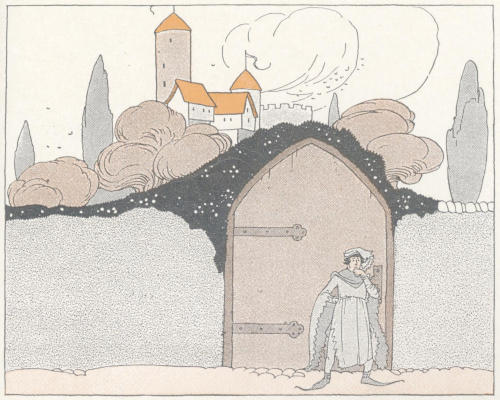
Mother made Betty’s everyday dress.
She bought a pattern and laid it on the cloth.
She cut it out and basted it.
When it was basted, Mother called Betty.
“Come, Betty,” said Mother. “I want to fit your dress.”
“You are a dressmaker today, Mother,” said Betty. “I’m a fine lady that has come to have a dress fitted.”
“Then you must stand very still, Betty, while I fit your dress.”
When the dress was fitted, Betty said, “Now I’ll play I’m a dressmaker.[120] This is my shop. Come, Bobby. Be a fine lady. Let me make you a dress.”
“I don’t want to be a fine lady,” said Bobby. “I don’t want a dress. I’m a tailor. This is my shop.”
“You can’t make a suit of clothes,” said Betty.
“I can make an apron,” said Bobby. “See, Teddy-bear is a shoemaker. I’ll make the shoemaker an apron.”
Mother gave them some pieces of cloth.
She gave each a needle and thread.
They played Bobby was a tailor and Betty a dressmaker.

“My scissors are dull,” said Mother, when she began to cut out Betty’s aprons. “I wish the scissors-grinder would come.”
“He is coming,” said Bobby. “I hear his bell.”
“That sounds like his bell,” said Mother. “Look out, Bobby, and see if it really is the scissors-grinder.”
“It is the scissors-grinder!” cried Bobby. “He is coming down the back street.”
They looked out and saw the scissors-grinder.
He was carrying his grindstone on his back and playing a tune with his bell.
“Call him, Bobby,” said Mother.
The scissors-grinder was quick to see Bobby.
Before Bobby had time to call, he had turned in toward the back door.

He swung his grindstone from his back and set it on the ground.
“Will you please sharpen my scissors?” asked Mother.
The scissors-grinder took the scissors in his hand.
Then “Whir-r-r, whir-r-r, whir-r-r,” went the grindstone. Sparks flew from the whirring stone.
Bobby and Betty stepped back. They were afraid of the grindstone.
“Any knives to grind?” asked the scissors-man when the scissors were ground.
“Yes,” answered Mother. “I wish you would grind this knife.”
Again the wheel went, “Whir-r-r, whir-r-r, whir-r-r.”
Again sparks flew from the grindstone.
Then the man gave Mother the knife, and she paid him for his work.
The scissors-grinder now swung his grindstone on his back. Again he rang his bell.
Bobby and Betty watched the scissors-grinder until he turned a street corner.
One day Mother read some verses to Bobby and Betty.
She read “Little Blue Apron.”
“Is that ‘Little Blue Apron’?” asked Betty.
“Yes, dear,” answered Mother. “If I don’t get you a new hat soon, you will be like ‘Little Blue Apron.’”
“I like ‘Little Blue Apron,’” said Betty.
“But I should like to have a new hat, Mother.”
“I will get you a hat,” said Mother. “We will go to the milliner’s shop today.”
When afternoon came, Mother said, “Bobby, be a good boy. Stay and play with baby.”
Then Mother and Betty went down the street to the milliner’s shop.
When they reached the shop, they stood and looked at the hats in the window.
“Those are ladies’ hats,” said Mother. “Let’s go in.”
“Do you wish a hat for yourself, Madam?” asked the milliner.
“Not today,” answered Mother. “Please show us some hats for little girls.”
“That is a pretty hat,” said Betty.
“It’s pretty, but it won’t wear well,” said Mother.
“How do you like this hat?” asked the milliner.
“That is better,” said Mother. “I like the shape.”
“It’s very becoming,” said the milliner when she put the hat on Betty’s head.
“How do you like it, Betty?” asked Mother.
“I like it,” answered Betty.
“It’s a nice hat for a little girl,” said Mother. “It will match your dress.”
“Will you buy it for me, Mother?” asked Betty.
“Yes, dear,” answered Mother.
Mother paid the milliner for the hat.
The milliner put the hat in a paper bag and handed it to Mother.
“Thank you,” said the milliner. “Come in again.”
“Thank you,” said Mother. “We shall be glad to come again.”
On the way home, they stopped at a candy store. Mother bought three sticks of candy.
Then Mother and Betty went home to Bobby and baby Billy.
Betty showed her new hat to Father.
“That’s a very nice hat,” said Father. “Did Mother buy one for Bobby?”
“No, Daddy,” said Betty. “Mother and I went to the milliner’s shop. The milliner doesn’t have hats for boys as big as Bobby.”
“That’s so,” said Father. “Bobby can get a good hat at the dry-goods store.”
“Won’t you take him there in the morning?” asked Mother.
“Yes,” said Father. “I’ll take him with me tomorrow morning. I pass the store on my way to work.”
Bobby knew nothing about going until the next morning.
Then Mother said, “Bobby, Father says you may go with him this morning.”
“Good!” cried Bobby. “That will be fun. Daddy, where are we going?”
“To the dry-goods store,” answered Father.
“Is that the store where I got my new suit?” asked Bobby.
“Yes, Bobby,” answered Father. “We will see if we can find a hat in the store for a boy of your size.”
“It’s for me, Daddy, isn’t it?” asked Bobby.
“Have you been a good boy?” asked Father.
“When Betty went with Mother to get her hat, I stayed with baby,” said Bobby. “I played with him.”
“That’s a good boy,” said Father. “I think we can find a hat for you in the dry-goods store.”
“I am sure we can, Daddy. They have ever so many things in the dry-goods store.”
When Father and Bobby went into the store, a salesman asked, “What can I show you?”
“Boys’ hats,” replied Father.
The salesman showed Father and Bobby the way to the place where boys’ hats were kept.
Bobby tried one on.
“That’s too small,” said Father. “Find a larger one for him.”
“This hat is larger,” said Bobby.
“How does it feel?” asked Father.
“All right,” said Bobby.
“I’ll take the hat,” said Father.
Father paid the salesman for Bobby’s hat.
Then he turned to Bobby and said, “Take your hat, young man. Now run home.”
Bobby ran home with his new hat.
He showed it to Mother.
“That’s a nice hat for a little man,” said Mother. “You are old enough now to lift your hat when you meet a friend on the street.”
“Why should I lift my hat, Mother?” asked Bobby.
“Gentlemen always lift their hats,” said Mother.
“Daddy does,” said Bobby. “I’ll ask him to tell me about it.”
That night Bobby asked, “Daddy, why do men lift their hats?”
“Sit down,” said Father. “I’ll tell you about it.”
Bobby and Betty drew up their chairs.
“A long, long time ago,” said Father, “there were knights who dressed in full armor.”
“I’ve seen pictures of them,” said Bobby. “Mother showed us a picture of a knight in full armor.”
“In those days,” added Father, “it was not safe for a knight to go out unless he was dressed in full armor. But when a knight was among his friends, he took off his helmet.”
“Why did he take off his helmet?” asked Bobby.
“He was among friends,” answered Daddy. “It was safe to do it. And so when a knight took off his helmet, he the same as said, ‘I am in the presence of friends.’”
“That was a nice way to say it,” said Betty.

“Yes, dear,” said Father. “And a man has a nice way of saying about the same thing.”
“What is a man’s nice way of saying the same thing, Father?” asked Bobby.
“It is by lifting his hat,” answered Father.
“What does he say when he lifts his hat?” asked Bobby.
“When a man lifts his hat, it’s a way of saying, ‘I am in the presence of friends.’”
“That’s a good story,” said Bobby. “I like it.”
“Put on your hat, my little man,” said Father. “Play you are walking on the street. Betty, play you are a friend.”
Bobby put on his hat and walked up and down the room. Soon Betty met him. Bobby lifted his hat as he passed her.
“Well done, young man,” said Father. “Now tell me what you meant to say when you lifted your hat.”
“I am in the presence of a friend,” said Bobby. “That’s what I meant to say.”

Bobby has a blue laundry bag in his closet.
Betty has a yellow laundry bag in her closet.
They put their soiled clothes in their laundry bags.
Sometimes Mother sends soiled clothes to the laundry.
The laundryman calls for them.
Bobby and Betty fold the clothes before the laundryman comes.
Mother ties them in a neat bundle.
She gives the bundle to the laundryman when he calls for the clothes.
A few days later the laundryman brings back a bundle of clean clothes.
He gives Mother the bill for the laundry, and she pays him for the work.
Bobby and Betty help Mother put the clean clothes away.
Then they play laundryman.
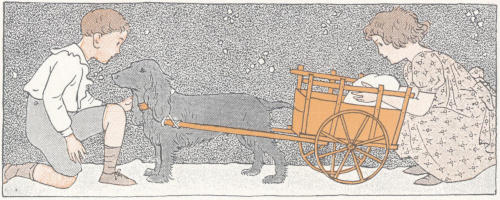
They hitch Queen to the cart and call for Dolly’s and Teddy-bear’s clothes.
They play they wash and iron the clothes.
Then they bring them back to Teddy-bear and Dolly.
Does the laundryman ever call at your house?
Does your mother make a list of the clothes she sends to the laundry?
Cleanliness is next to godliness.
Sometimes Father goes to the barber’s shop.
Sometimes Bobby and Betty go.
The barber cuts their hair.
One morning Father said to Bobby, “Your hair is too long. You should go to the barber and have him cut it.”
“All right,” said Bobby.
“Betty’s hair should be cut,” said Mother. “It is getting too long for a little girl.”
“May we go to the barber today?” asked Betty.
“Yes, dear,” answered Mother.
That afternoon Mother took the children to the barber’s shop.
There was a big pole in front of the shop.
“That is his sign,” said Bobby.
“How do you know?” asked Betty.
“Daddy said so,” answered Bobby.
The barber met them at the door.
“How do you do?” said he.
“Very well, thank you,” said Mother.
Bobby and Betty said, “How do you do?”
“What can I do for you today?” asked the barber.
“Please, Mr. Barber, I want my hair cut,” said Betty.
“I want my hair cut,” said Bobby.
“Very well,” said the barber. “Lay off your things, children. Madam, be seated. Here is a chair, little boy. Come, little girl, sit in this big chair.”
Betty stepped forward and the barber helped her get into the big chair.
He put a towel around Betty’s neck.
He took out a comb and a pair of shears and began to cut Betty’s hair.
Once Betty dodged.
“Sit still, little girl, sit still,” said the barber. “I shall not hurt you.”
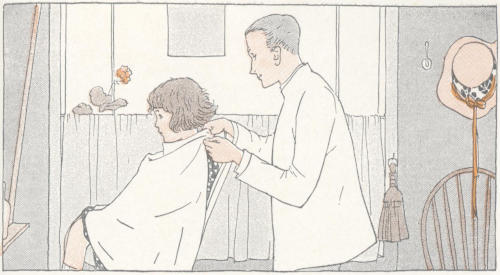
Betty tried to sit very still.
Her hair was soon cut.
“Shall I curl it?” asked the barber.
“Yes, please,” said Betty. “I like curly hair.”
When Bobby took the chair, he said, “I don’t want any curls.”
“That’s right,” said the barber. “You are too big to have your hair curled.”
When the barber had cut Bobby’s hair, Mother paid him for his work.
Then they all went home to get dinner ready for Father.
One day the broom man came down the street.
“Brooms, brooms, brooms!” called the broom man.
“Come and buy. Come and buy a broom!”
“Mother! Mother!” called Bobby and Betty. “Don’t you want to buy a broom?”
“Yes,” said Mother. “My old broom is wearing out. I need a new broom.”
Bobby called to the broom man, and he came to the back door.
Mother bought a new broom.
She paid the broom man eighty cents.
Then he went down the street calling, “Brooms, brooms, brooms!”
“Let me sweep with the new broom,” said Bobby.
Mother let Bobby sweep the back porch.
“Now it’s my turn to sweep,” said Betty.
“You may sweep the steps,” said Mother.
Betty worked very hard.
She wanted to sweep the steps clean.
“I could sweep better, Mother, if I were a little bigger,” said Betty. “I wish the broom was not so big.”
“This broom is too big for a little girl,” said Mother.
“Some day I will buy you a smaller broom.”
“Oh, thank you, Mother,” said Betty. “Buy me a little broom.”
“You shall have a little broom,” said Mother. “And tonight I will teach you and Bobby a song about broom girls who sold little brooms.”
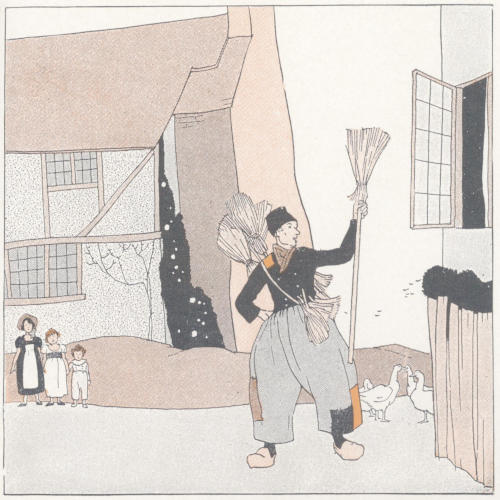
“O Betty!” cried Bobby. “The balloon man is coming. I can hear his horn.”
“I can see him,” said Betty. “Just look!”
“My!” said Bobby. “Aren’t they pretty? I wish I could have a red balloon.”
“Let’s ask Mother if we can buy one,” said Betty.
Bobby ran and Betty ran, but Betty ran the faster.
“O Mother!” cried Betty. “Please give me ten cents. I want to buy a balloon.”
“Please give me ten cents,” said Bobby. “I want to buy a red balloon. Just look at it, Mother!”
“You have been good children today,” said Mother. “You may each buy a balloon.”
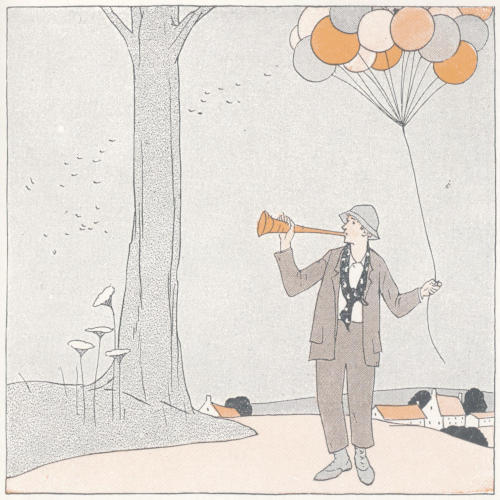
Mother gave each of them ten cents and they ran out to the street.
The balloon man saw them coming and cried, “Balloons! Will you buy a balloon?”
“Please, sir,” said Bobby. “I will buy that red balloon. How much is it?”
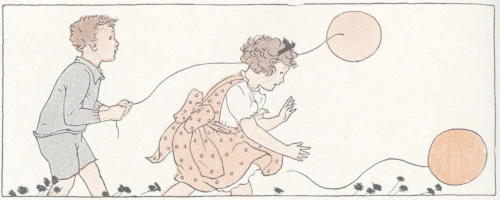
“Ten cents,” answered the balloon man.
“Here is a dime,” said Bobby.
“Take hold of the string, little boy,” said the man. “Don’t let it get away from you.”
“Please, sir,” said Betty. “I want to buy a balloon.”
“Which one will you have, little girl?” asked the balloon man.
“I want a yellow balloon, if you please,” said Betty. “Here is a dime.”
The balloon man took the dime and said, “Be careful, Miss. Keep hold of the string.”

“Listen!” said Bobby. “Is that the band?”
“Let’s go and see,” said Betty.
Bobby and Betty ran out to the street.
A hand-organ man was coming.
He had been playing up the street and now was coming near.
“Let’s go and hear him play,” said Bobby.
“All right,” said Betty.
So Bobby and Betty ran up the street.
All the children in the block came out.
Some of them danced and clapped their hands while the hand-organ man played.
The organ man kept looking up at the windows.
“Here’s a nickel,” said a woman to her little boy. “Take it to the hand-organ man.”
The boy took the nickel to the organ-grinder.
He played another piece.
When this was played, Bobby said, “Please play another. I’ll bring you a penny.”
Bobby and Betty ran to the house and Mother gave each of them a penny.
Bobby gave his penny to the hand-organ man, and the man started to go.
“Play another piece,” said Betty. “I’ll give you a penny.”
Again the organ-grinder played.
Betty gave him a penny.
The organ-grinder went farther down the street.
All the children followed.
When they came to the end of the block, all but Bobby and Betty turned back.
Bobby and Betty stood still.
“It’s time to go back,” said Bobby.
“Let’s go a little farther,” said Betty. “Mother won’t care.”
The organ-grinder started a lively tune.
Bobby and Betty forgot to go back home.
They followed the organ-grinder.
On they went from house to house after the organ-grinder.
Sometimes they skipped and danced when the organ man played.
“This is fun,” said Bobby.
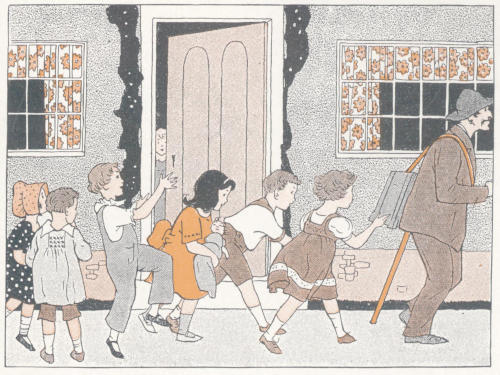
“It’s just like being grown up,” said Betty.
So Bobby and Betty had a fine time as long as the organ man played his tunes.
When he stopped playing, they began to feel tired.
“Let’s go home,” said Betty.
So Bobby and Betty turned back, but they did not know the way home.

At first Mother did not miss Bobby and Betty.
But after a while she wondered where they were.
She went to the door and called, “Bob-by!”
There was no answer.
Then she called, “Bet-ty!”
Still there was no answer.
Then Mother guessed what had happened.
She went to the telephone and ’phoned to the policeman.
She told him Bobby and Betty were lost.
She asked him to help find them.
“How old are your children?” asked the policeman.
“Six years old,” said Mother.
“Don’t worry, Madam,” he said. “I’ll bring the children to you.”
While the policeman was hunting for Bobby and Betty, they were going on and on.
“I’m tired,” said Betty. “I want to go home.”
“Cheer up,” said Bobby. “Don’t cry, Betty, please. We’ll find Mother’s house, by-and-by.”
“Do you know the way home?” asked Betty.
“I think so,” said Bobby.
But even brave Bobby soon said, “I don’t know the way.”
Just then the policeman met the children.
“Where are you going?” he asked.
“We are going home,” answered Bobby. “But we can’t find the way.”
“Come with me,” said the policeman. “I’ll show you the way.”

Bobby and Betty were a long way from home. But the policeman knew the way.
“I’m glad we found you,” said Bobby. “I’m glad you know the way.”
“That’s funny,” said Betty. “We lost the way and we found you. And you know the way.”
“Will you show us where Mother’s house is?” asked Bobby.
“To be sure, I will,” answered the policeman. “That is part of my business.”
“Do you do anything else?” asked Bobby.
“Oh, yes,” answered the policeman. “I walk up and down the streets and take care of the people.”
“Are you their father?” asked Betty. “Are you the father of all the people on the streets?”
“Hardly that,” answered the policeman.
“I know what you are,” said Bobby. “You are a big brother. You are a big brother to all of the people on the streets.”
“Now you have hit it, my little man,” answered the big policeman. “I try to be a big brother to the people along the streets.”
By this time it was almost dark, but Bobby and Betty were now nearly home.
“Do you know this street?” asked the policeman.
“Oh, yes,” cried Bobby. “We live just around the corner.”
Bobby and Betty almost ran the last few steps of the way.
They were soon at the door.
They could not wait for the policeman to ring the bell.
They opened the door and ran straight to Mother.
They threw their arms around her.
“O Bobby! O Betty!” cried Mother. “I am so glad to see you.”
Mother thanked the policeman for bringing the children home.
“You are very welcome,” said the policeman.
“Did you thank the policeman?” asked Mother.
“Thank you, thank you,” said Bobby and Betty.
“I hope we shall find you again,” said Bobby.
“I am glad you are everybody’s big brother,” said Betty.
“Thank you,” said the policeman. “But remember, your big brother thinks you had better play nearer home.”
“Tell me all about it,” said Mother.
Bobby and Betty told Mother they followed the organ-grinder. They told her they skipped and danced to the music the organ man played.
They told her they started home when the organ man stopped playing.
They told her the big policeman came and asked them where they were going.
“Were you afraid of the policeman?” asked Mother.
“I was at first,” said Betty. “But, Mother, he is a big brother. I’m not afraid of him now.”
“This policeman is a kind man,” said Mother. “I wish all policemen were like him.”
“Aren’t they all big brothers?” asked Bobby.
“That is what they should be,” answered Mother. “But not all policemen are big brothers.”
“I am glad we found the big-brother kind,” said Betty.
“So am I,” said Mother. “But tell me, children, why did you follow the organ-grinder beyond the end of this block?”
“He played beautiful music,” said Betty. “The music pulled us along, Mother.”
“I know,” answered Mother. “I know how music pulls you along. But[167] my little ones must not let music pull them away from home.”
“Next time it pulls, I’ll pull the other way,” said Bobby.
“Bobby did pull a little,” said Betty. “Next time I’ll help him and we’ll come back to you.”
“That is right. Listen to the music when the organ-grinder is in this block,” said Mother. “When he goes to the next block, it is time to pull away from the music and come home to Mother.”
“I’m glad we are home now,” said Bobby.
“I wish you had been here this afternoon,” said Mother. “You can’t guess what you missed!”
“What was it, Mother?” asked Betty.
“Mrs. White came over with some ice cream,” said Mother. “She had more than she needed. She wanted you to have some.”
“Did you save it for us?” asked Bobby.
“I wanted to save it,” answered Mother.
“Did you save the ice cream, Mother?” asked Betty.
“I had no way to keep it, children. So I called in John and Josie, and they ate the ice cream.”
“Oh, fudge!” said Bobby. “I wish we had come home.”
“So do I,” said Betty. “I wish we had turned back when John and Josie did.”
“If we had turned back, we should have had the ice cream,” added Bobby.
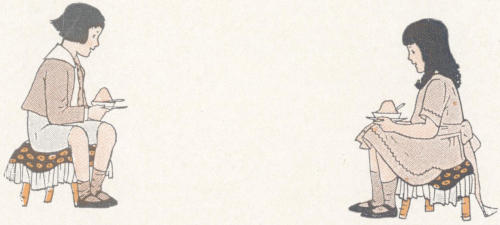
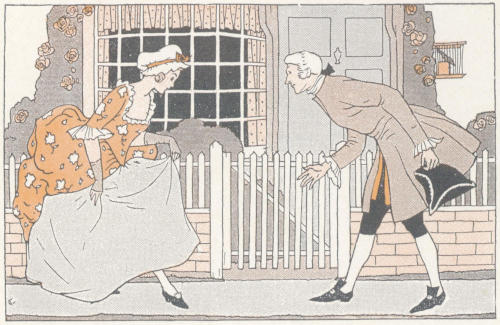
All work and no play makes Jack a dull boy.
Dare to say no.
Be good, sweet maid, and let who will be clever.
Every morning the newsboy comes with a newspaper.
He leaves it on the back porch.
Sometimes Bobby brings it in to Father.
Sometimes Betty brings it to him.
Father likes to read the paper before he goes to his work.
One morning Father said to Bobby, “Bring in the paper.”
“It hasn’t come, Daddy,” answered Bobby.
“The newsboy is late this morning,” said Father.
“He is coming now,” said Betty. “I see him.”
Bobby went out on the back porch.
The newsboy tossed a paper on the porch and ran to the next house.
Bobby took the paper to Father.
“Thank you, Bobby,” said Father.
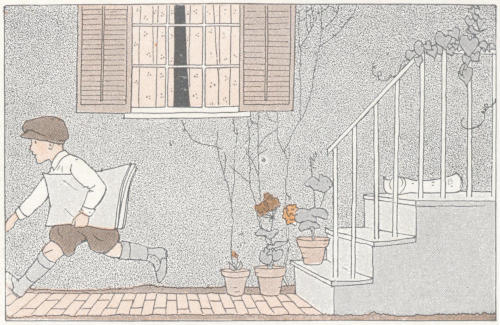
“I want to be a newsboy,” said Bobby. “Mother, may I be a newsboy?”
“What is that you are saying?” asked Father.
“I want to be a newsboy, Father,” said Bobby.
“Betty, what do you think of that?” asked Father.
“I think Bobby is too little,” said Betty. “When Bobby is bigger he can be a newsboy.”
Every day the postman comes with mail in his mail bag.
He takes mail out of the mail bag and puts it in the letter box.
He rings the bell and then goes on to the next house.
When Bobby and Betty are at the front door, the postman hands them their mail.
When it is in the letter box, Mother lets them take the key.
They unlock the box and take out the mail.
Then one of them locks the box and the other one takes the mail in to Mother.
One day Bobby asked, “Where does the postman get the mail?”
“At the post office,” said Mother. “The postmaster has men to sort the mail and take it to the people.”
“Does the postmaster pay our postman?” asked Bobby.
“No, dear,” answered Mother. “Uncle Sam pays our postman.”
“Does Uncle Sam pay the postmaster?” asked Bobby.
“Yes, Bobby,” answered Mother. “Uncle Sam pays all the men who take care of the mail.”
“Where does Uncle Sam get his money?” asked Bobby.
“This is one way he gets money for the work,” answered Mother. “Uncle[175] Sam sells postage stamps. Every time we buy a stamp we help Uncle Sam pay for carrying the mail.”
“I didn’t know that before,” said Betty.
“I didn’t know it,” said Bobby.
“Some day I’ll buy a postage stamp. I’ll send a letter and help Uncle Sam. I’ll help him pay his men who take care of the mail.”
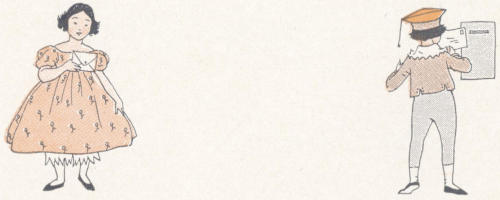
Bobby and Betty wanted to earn money.
They wanted to buy roller skates.
So Mother said, “Save the old newspapers. You may sell them to the junkman.”
Bobby and Betty saved the old newspapers.
They made neat bundles.
When they had three big bundles, Mother said, “Now, children, you may sell them.”
That very day Bobby and Betty heard the junkman calling.
“He’s coming,” cried Bobby. “The junkman is coming.”
Bobby and Betty ran to the back gate.
The junkman was driving nearer and nearer, calling, “Pa-pers! pa-pers! Any old pa-pers to sell?”
“Yes!” shouted Bobby. “We have some old papers to sell.”
“Whoa! whoa!” called the junkman to his horses.
The horses stopped at the back gate.
The junkman jumped down from his wagon.
“This way,” said Bobby.
Bobby and Betty led the way to the back door.
“Here are the bundles,” said Bobby.
The junkman had his scales in his hand.
“Thirty pounds,” said he when he weighed the first bundle of papers.
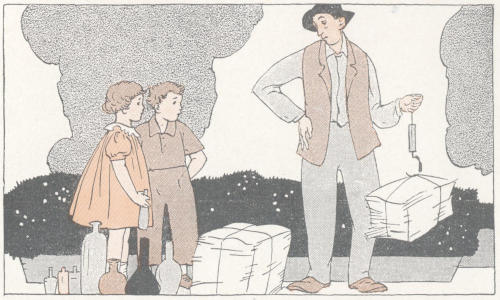
“Forty pounds,” said the junkman when he weighed the second bundle of papers.
He then weighed the third bundle. “Thirty pounds,” he said. “One hundred pounds. I will give you twenty-five cents.”
Bobby reached out his hand for the money.
“Have you any bottles?” asked the junkman.
“Yes,” answered Betty. “Here are twelve bottles.”
“Three cents,” said the junkman, and he handed the money to Betty.
“Anything else?” asked the junkman.
“That is all,” said Betty.
The junkman picked up his load and took it out to the wagon.
“Gid-ap!” said the junkman to his horses.
The horses started.
And again the junkman called out, “Papers! pa-pers! Any old pa-pers to sell?”
When the junkman had gone, Betty said, “How much money do you have, Bobby?”
“Twenty-five cents,” answered Bobby. “How much do you have?”
“Three cents,” answered Betty. “Give me some of yours.”
Bobby looked puzzled. He knew that part of the money was Betty’s. But[181] he did not know what to do with the twenty-five cent piece he had.
“Let me help you,” said Mother. “I’ll change the quarter. Then you and Betty can divide your money.”
So Mother gave Bobby two dimes and five pennies for his quarter.
Then Bobby and Betty worked and worked.
At last they saw how to divide it.
“See, Mother,” said Bobby. “I have fourteen cents.”
“I have fourteen cents, Mother. See!” said Betty.
“That is a nice start,” said Mother. “Put the money in your savings banks. Then it will not get lost.”
“I want to earn more money,” said Betty.
“What can we do?” asked Bobby.
“I will tell you what to do,” said Mother. “Father has some old clothes he doesn’t want to keep. You may sell them to the old-clothes man.”
“Good!” cried Betty.
“Hurrah!” cried Bobby.
That very day the old-clothes man came down the street.

“Any old clothes to sell? Any old clothes to sell?” called the old-clothes man.
“Yes, yes,” cried Bobby and Betty.
The old-clothes man came to the back door.
“You may sell the suit,” said Mother to Betty.
“Bobby, you may sell Father’s old shoes.”
“Any men’s clothes?” asked the old-clothes man.
“Yes,” answered Betty. “How much will you give for this suit?”
“Two dollars,” said the old-clothes man.
Betty looked at Mother.
“That is not enough,” said Betty.
“Two dollars and a half,” said the man.
Again Betty looked at Mother, and again Mother shook her head.
“Three dollars,” said the old-clothes man.
This time Mother nodded her head to Betty, and Betty said, “You may have it.”
Then the old-clothes man gave Betty three dollars and asked, “Any men’s shoes to sell?”
“Yes,” answered Bobby. “Here is a pair.”
The old-clothes man looked at the shoes. “Fifty cents,” he said.
Bobby looked at Mother, then said to the man, “That is not enough.”
“A dollar,” said the man.
“Take them,” said Bobby after he had looked up at Mother.
The old-clothes man gave Bobby a dollar for Father’s old shoes.
“Anything else?” asked the old-clothes man.
“Yes,” answered Betty. “Here is a pair of ladies’ shoes.”
The old-clothes man looked at the shoes and said, “Too small. Can’t use them.”
“That is all we have to sell,” said Betty.
The old-clothes man picked up the old clothing and said, “Good day, good day.”
“Good day,” said Mother and the children. And the old-clothes man went away.
As soon as he had gone, Bobby said, “I have a dollar. Betty how much do you have?”
“Three dollars,” answered Betty.
“Give me a dollar,” said Bobby. “Then we’ll each have two dollars.”
Betty looked puzzled. Then she said, “Yes, that is right. Here is a dollar. Now you have two dollars and I have two dollars.”
“Mother, don’t we have enough to buy roller skates?” asked Bobby.
“I think you have,” answered Mother. “How much do you have in all?”
“I have two dollars and fourteen cents,” said Betty.
“That is just what I have,” said Bobby.
“I think we can get good skates for that price,” said Mother. “We will go to the hardware store this afternoon. You may buy roller skates.”
Have you ever been in a hardware store?
What do you have in your kitchen that was bought in a hardware store?

“Is it time to go?” asked Bobby.
“Not quite,” answered Mother. “Is it hard to wait?”
“Yes,” answered Bobby. “I can hardly wait. I want to go to the hardware store and buy roller skates.”
Soon Mother and the children were on the way.
When they came to the hardware store, they looked at the things in the window.
“See!” cried Bobby. “See those roller skates! That’s the kind I want.”
“That’s the kind John and Josie have,” said Betty. “I like that kind.”
When they went in, the hardware man said, “What can I do for you today?”
“The children want to buy something,” answered Mother.

“What can I show you, little boy?” asked the man. “What can I show you, little girl?”
“Roller skates, please,” said Betty.
“I want to buy roller skates,” said Bobby.
“How do you like this skate?” asked the man.
Bobby shook his head.
“How do you like it, little girl?”
Betty shook her head.
While the hardware man was looking for others, Mother asked, “What is the matter, Bobby? What kind do you want?”
“I want the kind where you get two skates,” said Bobby.
“I want that kind,” said Betty.
Mother bent down and whispered to Bobby and Betty. You can guess what she said.
When the hardware man came back to them, Bobby asked, “What does a pair like this skate cost?”
“Two dollars,” said the man.
“I’ll take a pair,” said Bobby.
“I’ll take a pair just like Bobby’s,” said Betty.
“Here is the money,” said Bobby.
“Here is the money for mine,” said Betty.
“Thank you, thank you,” said the hardware man.
While he was wrapping up the skates, Bobby said, “I have fourteen cents left.”
“So have I,” said Betty.
“Why not put the money you have left in your savings bank?” asked Mother.
“That’s just what I’ll do,” said Bobby.
“That’s just what I’ll do,” said Betty. “I’ll keep my money in the savings bank until I have enough for a bicycle!”
Bobby and Betty had many a good time with their roller skates.
Some other time you may like to learn what they did the next summer.

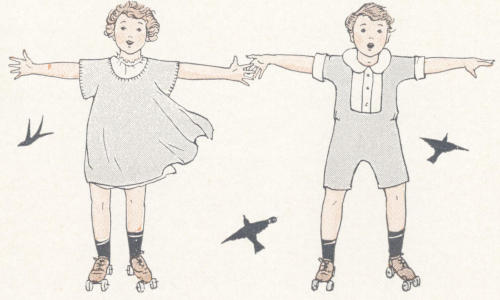
It may be that supervisors and teachers of primary grades have been looking for a book dealing with the occupations in the neighborhood of a city child. The author of this book looked for such a book years ago and found it not. So for years materials have been accumulated for the preparation of this reader. It is hoped that all who use it will enjoy it and gain something of value from it. If the activities recommended in the following pages are introduced, the work is bound to prove a joy to teachers as well as to their pupils.
For study and play. Each story is followed by related rimes, riddles, and games which may be used in different ways even by children of the same class. For instance, one child may be able to read and memorize a rime which another child finds difficulty in reading. The latter, however, can read parts of the rime and find familiar words and phrases, and when he hears the rime repeated in class the jingle of the words is likely to stay with him and aid him in his second attempt.
These old rimes and jingles are a part of the child’s social heritage. They have come down through the centuries. It is right that every child should become familiar with them and enjoy their humor and rhythm. Nearly all of them are full of action. Let children use them in dramatic play; let them make drawings to illustrate points where they discover a mental picture.
The riddles may be learned. The answers are given, for children of the first grade rarely guess riddles. They love them, however, and delight in repeating them for others to guess.
Original poems by children. In preparing the lessons it was not difficult to find rimes and jingles of the old trades and[194] tradesmen, but nothing could be found in folklore on the newer occupations such as those of the iceman, laundryman, grocer, garbage man, policeman, and newsboy. It did not seem well to present these occupations without some appropriate rime, so an appeal was made to children of primary grades to assist the author by making rimes. Among those sent in by their teachers six were selected, credit being given in each case to the grade and school. Although the teachers are not named, they are not forgotten.
The children who use this book can make verses and should be encouraged to do so. Such compositions foster the creative impulse found in every child in the pre-school period, but too often atrophied through disuse on account of conditions and methods not yet altogether out of date in our educational system. Attention is called to the verses on the iceman by a third grade in Hinsdale, Illinois, as being an example of the excellent results which come from group work. Undoubtedly no one of the children could have composed such verses by himself. But under the impulse of a strong emotion and through united effort they produced verses we all may enjoy. Children of the first grade cannot be expected to produce verses to equal these, yet it may not be impossible for them to do so; at any rate, we all know that the youngest children sometimes produce rare literary gems.
Dramatic play. Let the children dramatize these lessons, using their own experiences with the iceman, milkman, and other workers as well as the materials given in the text. If at first they act the story in pantomime, let them do so. Young children have difficulty in the use of language and can secure more rapid action by means of gestures and pantomime. Such play develops clear mental pictures which soon find expression in words. It is well to give children freedom in dramatic play. Such freedom will not be abused if responsibility is placed upon them and if an atmosphere is[195] secured which promotes concentration. The first plays should be very simple ones consisting of the action in one place. Sometimes it may be the representation of Bobby and Betty talking with their mother; again it may be at the baker’s shop, and again on the way home. Children quickly discover the natural divisions of a play and become interested in playing the whole story and thus finding a way of representing different scenes in an act. The dramatic play from day to day requires nothing in the way of costume; but, if later it seems best to represent a more finished play, the children will enjoy planning and making simple caps, aprons, coats, and dresses of paper or inexpensive material for the various characters. A procession of workers will prove interesting, each child representing one of the characters. Each one should be asked to do something which the worker he represents might do, whether it be the imitation of movements, an action song, or repeating an appropriate jingle. A delightful entertainment easily grows out of the work from day to day.
Games. In addition to dramatic plays children should play games. “Drop the Handkerchief” may be played in connection with the postman; “Button, Button, Who Has the Button?” and “The Needle’s Eye” to supplement lessons on the dressmaker and the tailor; “Hunt the Slipper” while the children are studying the shoemaker; “The Muffin Man” and “Jack, Jack, the Bread’s a-Burning” in connection with the baker. “What’s Your Trade?” may be adapted to any one of the occupations and is played as follows:
Children divide into two groups by choosing sides or by any other arrangement. Children of the first group choose some occupation they are to act in pantomime, but do not tell the second group of children, for they are to guess it. When all are ready the two groups approach each other from opposite sides of the room.
First Group. Here we come. Here we come.
Second Group. Where from? Where from?
First Group. Milwaukee. Milwaukee. (The name of any place the children may choose may be substituted for “Milwaukee.”)
Second Group. What is your trade? What is your trade?
First Group. Watch and see. Watch and see.
Thereupon the children of the first group imitate the movements of the occupation selected until some one of the second group guesses it. Then the second group chooses an occupation for the first to guess.
The teacher may modify this by letting one child act an occupation for the class to guess. In such a case when he appears the children may repeat:
Old Man. Do anything.
Children. Work away.
The child who has the part of the old man or the old woman, as the case may be, imitates the movements of some occupation and the others guess it.
Songs. Occupation songs are dear to young children and should be used in connection with these lessons. Examine the books accessible and make a list of the songs of the shoemaker, baker, tailor, dressmaker, and other workers. At odd moments many songs can thus be found. If it seems best, enlist the coöperation of children and their parents in collecting such songs.
Among the many books containing appropriate songs to be used in this connection are the following:
If Book Two of the Eleanor Smith Music Course is at hand, teach the children “The Fruit Vender” and “Street Sounds” when studying the banana man, “Perrie, Merrie, Dixi” when reading “Father Tells a Story,” “Shoe and Slipper” when studying the shoemaker, and “The Concert” in connection with the organ-grinder. The children’s song books listed above contain many excellent songs of the occupations.
Construction. Let the children use building blocks to represent the baker’s shop with its show case and shelves where he sells his bread and cake and pies. His kitchen, too, is of great interest to children; if suitable arrangements can be made, take the class to visit a baker’s kitchen. After such a visit the baker’s kitchen and oven should be constructed; the children will doubtless find ways of making bread tins and long wooden shovels or paddles for taking bread from the oven.
The project will not completely satisfy unless the baker himself appears on the scene. Whether the toy baker shall be fashioned from a clothes-pin, a piece of cornstalk, corn husks, twigs, cloth, or wood may be left to the children, who doubtless will be pleased to include in the dress the characteristic white coat or apron and a white cap.
The shoemaker, and in fact all the characters included in this book, may be treated in a similar way. If something more permanent than block-building is desired, let the children bring small dry-goods boxes or boxes of cardboard or corrugated paper and fit them up for shops and stores. The furniture for such toy shops can be made of blocks of suitable size glued together, or by use of small cardboard boxes and[198] empty spools. Children are able to find ways and means of making such furniture, but they should not be deprived of the opportunity of seeing good forms made by others. At this period in the child’s life finished workmanship is not the aim. The product is of minor importance in comparison with the activity itself and its place in developing clear mental images.
Let the children mark out a familiar business street in their sand box and indicate the location of the shops and stores, which may be represented by small boxes. Of course, it will not do to have the stores vacant and the streets deserted. Tiny dolls may be made to represent the people, and tiny pushcarts, wheelbarrows, milk wagons, and automobiles for the street and alley. Larger pushcarts and wagons may be made as separate projects from time to time, but in the one under consideration everything must be on a small scale.
The milliner’s shop suggests the making of hats. Whether these be simple hats for a toy milliner’s shop, dolls’ hats of flowers of the season or other available material, or hats for Simple Simon, Colly-Molly-Puff, the Rabbit Woman, or any other character of the book, may be determined by the conditions when the study is made. The making of hats, caps, aprons, and other characteristic garments of the workers to be used in dramatic play provides another form of interesting and profitable work.
Drawing. Each lesson presents suitable subjects for children’s drawings. Use these day by day and encourage children to look for pictures in the lines they read and to put them on paper. One of the many interesting projects in connection with the study, and one which may be preserved in a somewhat permanent form, may be termed a group drawing of a street showing the shops, stores, sidewalk, and street, together with the people and vehicles. Such a group drawing may be made in sections and later placed on the wall so as to form one large[199] continuous picture. If preferred, paper-cutting may be used instead of drawing, and the objects pasted on large sheets. Such illustrations have been made by primary classes with excellent results.
Ethical ideas. Children readily understand the importance of honesty in weights and measures as well as in making change. They also know that their mothers prefer to buy groceries of a grocer whose store is clean and orderly and whose stock is of excellent quality. They can easily understand that the groceryman must understand his business, know how and what to buy as well as how to keep his stock in good order and sell it in a businesslike way. They will be interested in learning what each of the workers does for the community and what we as members of the community do for each in return for his service. They will learn to respect and honor the efficient and faithful worker and, it may be, even at this early age, get a glimpse of why it is that some do not succeed. Ethical ideas should not be forced upon the children, but can be brought out in their dramatic play and other activities. In such ways teach the children the value of cleanliness, order, intelligence, honesty, promptness, and fidelity, not only to the worker, but to the community as a whole.
Katharine E. Dopp
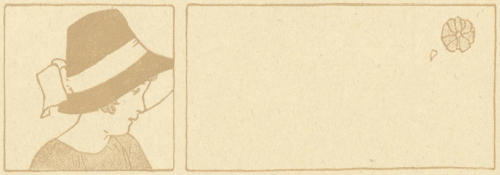

This eBook is for the use of anyone anywhere in the United States and most other parts of the world at no cost and with almost no restrictions whatsoever. You may copy it, give it away or re-use it under the terms of the Project Gutenberg License included with this eBook or online at www.gutenberg.org. If you are not located in the United States, you will have to check the laws of the country where you are located before using this eBook.